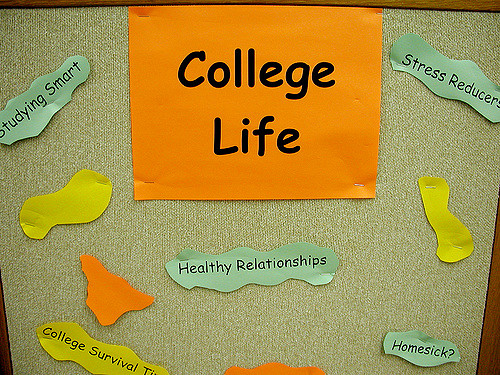
I have been a college teacher for nearly 20 years, and I’ve met a lot of students who had difficulty transitioning from their family life to the college life. Not only because they had no idea how to wash their clothes or be punctual in class, but that they were not emotionally and psychologically ready for college – and dorm – life.
In a semester, I’d probably hear or listen to students of mine say that they’re going home for good. They were not able to tackle the social and academic challenges that they were facing and decided just to quit. And to think some of these students excelled in high school – valedictorians, brilliant artists, and athletes. After a year, they got too overwhelmed that they quit in the middle of their freshman year.
As a parent, it is one of life’s achievements for their children to move on to college and successfully thrive in the ‘bigger world.’ However, they are the topic of most parenting magazines and shows on how over-protective they can be and how they are to blame for their children not to survive college. Perhaps some of that is true. That is my opinion, being a parent of two beautiful daughters who also had college struggles of their own.
So here’s to us. Some excellent tips on what you can do to help your son or daughter become college-ready.

- Allow Them To Struggle. As parents, we want to shield our children from challenges, but constantly protecting them from going through the struggle – and even failing – will do more harm than good. They should know how to accept failure on their own. They should not freak out or get crushed just because they received a B or a C on a test. I see this every year. The high school valedictorians are particularly those that belong to this group. They would come crying in my office telling me that they can’t accept it. They were top of their class in high school, so why would they get a B or a C in college? Then they can’t recover. “Setting limits helps your child develop a sense of self-control. Encouraging independence helps her develop a sense of self-direction. To be successful in life, she’s going to need both,” Laurence Steinberg, PhD points out.
All of us experience failure at some point in our lives. But as cliché, as it may sound, it’s not how many times we have failed, but how we were able to stand up, that defines who we are. Some parents just go too far as to make sure that their kid doesn’t fail. They’d go to the extent of dumping too many retests and tutorials and ask their teachers to reassess their grades. This is one of the reasons why some freshmen get into college with only learned helplessness with them. They do not have the capacity to solve their problems because they had their parents to it for them. Please. For your child’s sake – don’t bail them out always. Don’t make excuses for them.
- Observe How Well They Cope. I know it’s hard to see your kid fail and cry. But you also know that you need to let them go through it. “Your patience, reassurance, and listening ear can minimize tension as your children learn to cope with unfamiliar circumstances,” Jeanne Segal, Ph.D. and co-authors wrote. Learn how they cope with failure. How are they doing psychologically? Do they have proper coping mechanisms? Don’t worry about them getting anxious and stressed. Be with them to help them stand up and recover, but don’t take the front seat and handle their problems for them.
My daughter told me once that she would not take the difficult subjects because she’s afraid she won’t pass. I told her otherwise. I encouraged her to take what she thought was her most challenging courses so that she would know how to best tackle the worst of her academic problems. If she could go through them and even pass them, her favorite courses would be a breeze. Of course, I was there for her, ready to hug her and give her my love. I saw how she dealt with the pressure and learned how to cope with hardships. And it made me happy to be there for her, to watch her fail, stand up, and win.
- Provide Them Freedom To Make Mistakes. I don’t know about you, but if it were only me, I’d like to know where my kid is every minute of every day! When they went off to college, honestly, I too almost gave up with the setup. I couldn’t talk to them whenever I want, and they didn’t have as much time to talk to me anymore. But I had to pull myself together. I knew that they need to learn how to self-regulate regarding their time. I knew I had to let them go; otherwise, they couldn’t fend for themselves or manage their time on their own. According to Judy Willis M.D., M.Ed., “Allowing children to make mistakes while building understanding solidifies accurate learning connections.”
Hey, I’m not saying that you don’t have the right to ask them where they are. Of course, you do. However, you might want to give them the freedom to make their own choices first, and if they handle it right – like going to a party after an exam – then reward them with more trust and freedom.

These simple strategies will help your children build strength and character (read further here: Mom365.com), particularly self-confidence. And you, as a parent, will be able to improve your resilience and become better at parenting when you trust your children to know what’s best for them, through your guidance and love.